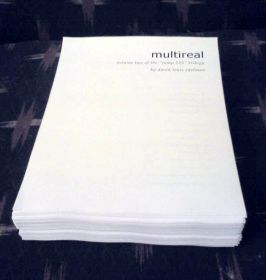 The photo you see here is the completed manuscript of my second novel, MultiReal, the sequel to Infoquake. It’s been somewhere around three years in the making, and now it’s done.
The photo you see here is the completed manuscript of my second novel, MultiReal, the sequel to Infoquake. It’s been somewhere around three years in the making, and now it’s done.
The book measures 477 pages, or about 148,000 words (including appendices). There are 6 sections, 45 chapters, and 8 appendices. The opening epigraph comes from Walt Whitman’s “Song of Myself.” The tagline? “Infinite possibility is only a state of mind.”
Now, when I say the book is done, of course that doesn’t mean it’s absolutely, completely done. That means it’s going off to my editor at Pyr, Lou Anders, for any last-minute comments. I’ll be printing out another copy of the book for myself and giving it a last read-through with red pen in hand. I’ll be incorporating those changes by the end of the month — and then the book goes off to the copy editor. But I expect the changes to be pretty minor from this point on.
(Want to know how finicky I am? The printouts after the jump below showing some of my line edits to MultiReal are from the fourth complete draft of the book.)
Here’s an example of the kind of changes I’m talking about. I discovered yesterday that, after who knows how many read-throughs and rewrites, in chapter 45 one of my characters was “threading her way through the throngs of Thasselians.” I’ll admit I’m not always above allocating an assortment of alliteration in my writing, but this one was totally unintentional. And it sounded ridiculous, so it needed to be fixed. (The even more ridiculous part is that I had misspelled “throngs” as “thongs.” Freudian slip?)
So having completed the book, I can definitely say this: you have never, ever read a book like MultiReal before.
MultiReal might be the most exciting book you’ve ever read that contains both a series of Congressional speeches and a three-way dartgun battle. It has both a granular discussion about the ethics of different software pricing models and a virtual sex scene with four-breasted mermaids.
To give you an idea of how complex this book is, chew on this: there are three main point-of-view characters, three minor point-of-view characters, one chapter in epistolary form, and one chapter from the global omniscient point of view. The prose slips from past to present tense a few times. You’re going to learn that one important piece of history mentioned in Infoquake didn’t quite happen the way you think it happened. Some of the characters speak in code. More than one have double allegiances. Oh, and have I mentioned the multiple, alternate, simultaneous, and asynchronous realities?